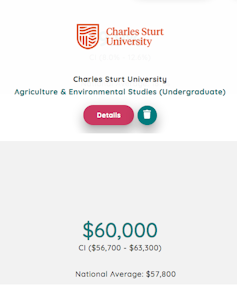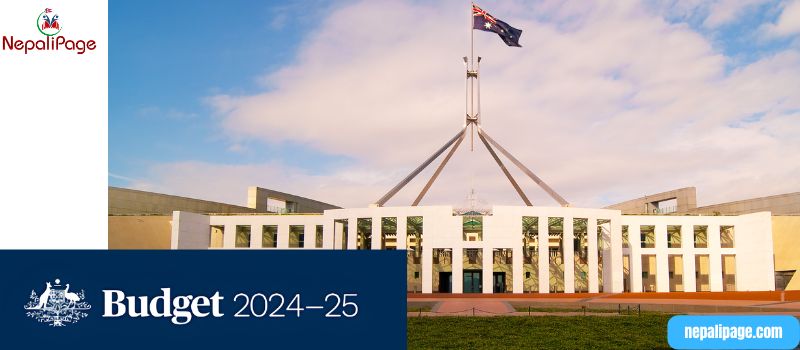Jason Brown, La Trobe University
 The government’s higher education funding changes aim to ensure graduates are “job-ready”. Students will be charged more for courses the government deems have poorer employment outcomes, to incentivise them into cheaper courses with supposedly better job prospects.
The government’s higher education funding changes aim to ensure graduates are “job-ready”. Students will be charged more for courses the government deems have poorer employment outcomes, to incentivise them into cheaper courses with supposedly better job prospects.
But these changes seem ignorant of the research surrounding future jobs, and the unpredictable nature of the market. Experts predict today’s graduates will have several different careers throughout their working life. A linear path from education to work makes little sense in a rapidly changing world.
Read more:
Can government actually predict the jobs of the future?
Changes can also happen fairly quickly that affect the availability of jobs. We saw this in the collapse of IT jobs after the dot-com bubble burst in the 2000s, and the demise of Australia’s car manufacturing industry in the last decade.
Instead of lowering fees for some courses to make them more attractive, the government should ensure better links between study and employment and strengthen careers advice for students to make better choices.
Why cheaper courses won’t help with career choices
Higher education expert Andrew Norton writes 80% of students enrol in courses with a specific job in mind and only 10% based on subject interest. But he explains interests and job goals aren’t mutually exclusive.
He says when survey participants are given the choice of multiple answers for why they chose a course, interest in the field of study is the most popular – more than 90% of respondents say it’s important. While three quarters of respondents say they have a specific job in mind.
This fits with something called vocational interest profiles. This theory holds a person’s choice of occupation is influenced by their personality.
Research on vocational interest profiles found students with a stronger preference for jobs that involve working with people (such as in sales, police work or nursing) had a one in 50 chance of being enrolled in STEM (science, technology, engineering and maths) courses.
Students with a stronger preference for conventional type jobs (those that involve working with data, rules or procedures) had a one in two chance of being enrolled in a STEM course.
Read Also: This should consider while choosing courses in Australia
Based on the strong link between a person’s interests and their career, the government’s plan to influence this choice by changing the price of courses will likely have a limited effect.
Instead, career education must be better
Research shows starting university students have a poor understanding of the potential careers their degree may lead to.
The government, universities and industry must work together to help students understand how their knowledge, skills and other attributes can be applied in the labour market, and where the opportunities exist.
Students also need better access to career education in high school and at university. Career services in universities have been recognised as under-resourced.
My research has found careers advisers are often employed as generalists, with workloads spread across career counselling, running workshops, developing curricula, designing programs and liaising with employers.
Employing more careers advisers will enable staff to specialise and deliver targeted support to more students.
Read more:
The government’s funding changes are meddling with the purpose of universities
To be effective, career education should be embedded in all university courses. It should provide opportunities for students to identify their knowledge, skills and other attributes and learn about the range of jobs and industries they can apply these.
It should also teach students how to identify and apply for jobs, and confidently articulate to an employer how they can contribute to the organisation.
Career education should be facilitated by qualified career development practitioners who can design career education programs in collaboration with academics and industry.
Examples of such collaboration include La Trobe University’s Career Ready Advantage, Deakin Talent, and Flinders University’s Horizon Award.
And labour market information
In addition to increased career education, the government needs to provide better labour market information so students can make informed decisions about identifying appropriate job opportunities.
A few resources are currently available, but they only give snippets of information and do not connect.
Two examples include:

Screenshot ComparEd
ComparED – a website for prospective students to compare courses and universities. The information is limited to graduate starting salaries, the proportion of graduates employed four months after course completion and graduates’ satisfaction with skill development achieved through the course.
This site could be improved by adding data, for each course, on the types of jobs and industries in which graduates find employment.
Job Outlook – a government website that provides labour market information such as average salary and predicted growth or decline in job vacancies.
It also has a handy Skills Match app which gives suggestions on jobs that use skills you have.
The app has limited value for graduates as it determines skills based on jobs you have already done. As an example, if a student has worked as a barista, Skills Match recommends similar jobs such as a kitchen hand or cleaner. It doesn’t ask what course you are studying or have completed, so it won’t recommend barrister if you’ve been studying law.
Together, a deliberate and well-resourced strategy to support university students’ career education and links with industry will be a more effective way to increase labour market productivity than price signals on university courses.![]()
Jason Brown, Lecturer in Careers and Employability Learning, La Trobe University
This article is republished from The Conversation under a Creative Commons license. Read the original article.











